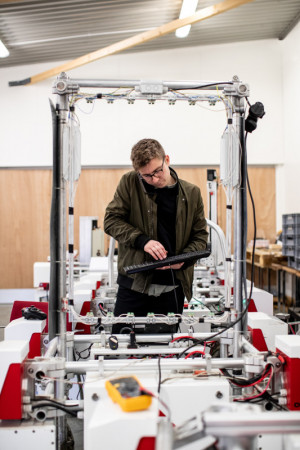
University of Bolton, Deane Road, Bolton. BL3 5AB
Tel:
Email:


“At the University of Bolton, we take great pride in providing a quality, supportive learning environment for our students.”
Professor George E Holmes DL | President & Vice Chancellor
“...tutors are very supportive and you’re not just a student ID number, at this university you are an individual with a name.”
Ellisse Vernon | BSc (Hons) Adult Nursing
Back to menu
Back to menu
Study with an Off-Campus Partner
Back to menu
Back to menu
University of Bolton, why we are the right choice
Location - Bolton, Greater Manchester

03/08/2022
Electrical engineering is an essential industry; we all need electricity. It’s also a sector that is experiencing higher levels of chaos than even with the significant electrical pricing increases. Electronic engineers are responsible for designing, building, and maintaining electrical systems, machinery, and equipment, and they work across industries including transport, energy, manufacturing, construction, and many more. Ultimately, it comes as no surprise that there is high demand for electrical engineering jobs. Let’s talk about some of the reasons who pursuing an electronic engineering degree would be a great path to pursue as a career. 
Perhaps, becoming a CAD technician appeals to you? Or perhaps, you like the idea of becoming an acoustic consultant or aerospace engineer? These careers are all possible with an electronic engineering degree.
Let’s have a look at some more avenues you could take with this degree:
- Broadcast Engineer
- Control and Instrumentation Engineer
- Design Engineer
- Nuclear Engineer
- Sound Engineer
- Special Effects Technician
Electrical Engineering Jobs in Booming Demand
As mentioned, there is a growing demand for electrical engineers, with overall employment levels being expected to grow by 7% from 2020 to 2030. Essentially, around 22,700 electrical engineering job openings are expected to become available each year, over the decade. Therefore, this sparks optimism for electronic engineering degree graduates to complete their studies with the knowledge to be able to enjoy the employability. What’s more is that an electrical engineering job is more than just becoming an electrical engineer; there are so many different doors that this degree can open.
High Earning Potential
One benefit of working in such a pivotal industry is the earning potential. A graduate electrical engineer in the UK could benefit from an average starting salary of £28,934. Which, after a few years, could increase to the region of £45,000. After all, who doesn’t love the prospect of earning more money? Particularly today when the more money you earn the better to cope with rising living costs.
Boost your Employability
Like the sound of a graduate electrical engineering job so far? Perhaps, you like the idea of working overseas. Well, many global electronics organisations keep research and development facilities in both the UK and Europe, meaning that there is potential for UK engineers to be posted abroad to work on projects. Therefore, if you have a willingness or a desire to travel the world, then an electronic engineering degree could be a great start to your career journey.
So, what skills can you learn from an electronic engineering degree?
Skills include the ability to creatively and innovatively use specialist knowledge to solve problems, improve your effective communication skills, good teamworking, project and time management, and giving you a professional approach and ability to work to an ethical code of conduct. Ultimately, this degree gives students the skill set to be in demand for not only the electrical sector itself, but also many other industries too.
See the Light with the University of Bolton
At Bolton University, our courses are highly recognised with accreditation from the Engineering Council and the Institution of Engineering and Technology, meaning that the teaching we give our students is in-line with the latest industry technologies and methods. Not only this, but as an engineering student, our students benefit from enjoying access to our dedicated laboratories, where they will complete hands-on project work, and using computer-aided design and computer-aided engineering software.
Wondering what skills our electronic engineering degree courses teach you? We are proud to offer courses that are designed by industry professionals so that they include modules that are key to obtaining a successful career. Additionally, our modules cover important areas such as electromagnetism, embedded systems, digital system processing, power electrics, smart grid technology, and renewable energy systems.
Skills include the development of industry-related engineering knowledge through theory and practical applications, taught in our very own positive, supportive learning environment.

Interested in letting Bolton spark your electrical career? Have a look at our BEng (Hons) Electrical and Electronics Engineering courses and see what best matches your needs and interests.
- BEng (Hons) Electrical and Electronics Engineering
- BEng (Hons) Electrical and Electronics Engineering with Foundation Year
- BEng (Hons) Electrical and Electronics Engineering (Degree Apprenticeship)
- BSc (Hons) Mechatronics (Top-Up)
Clearing 2022: Electronic Engineering
Secure your place on our course now by applying through Clearing. Clearing is a great opportunity to guarantee a place at a leading Greater Manchester university for Student Satisfaction*; voted first by our students for the past five years. Simply head to our instant offer page and enjoy a step-by-step guide about how to complete the application process.
If you need any support about applying to Bolton, please don’t hesitate to contact us on 01204 903030.
We are here to help!
Do you have questions about our electronic engineering degree, or about university life? That’s why we offer our on-campus Study Advice Sessions to help you get a first-hand feel for our campus and find out if you could see yourself calling Bolton home. Whether you need course or career advice, student finance, advice, student services support, or disability services, we have representatives available to help you.
Limited places available; book now to secure your place:
- Friday 19 August – 11am to 4pm
- Saturday 20 August – 11am to 4pm
- Thursday 1 September – 11am to 4pm
Need further information? Get in touch with us at opendays@bolton.ac.uk or give us a call on 01204 903807.
*Complete University Guide – 2023, 2022, 2021, 2020, 2019 - Northwest